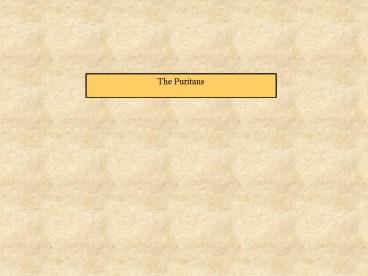The Puritans - PowerPoint PPT Presentation
1 / 13
Title:
The Puritans
Description:
A religious group who wanted to 'purify' the Church of England, the Puritans ... He delivered the sermon 'Sinners in the Hands of an Angry God' and was a major ... – PowerPoint PPT presentation
Number of Views:173
Avg rating:3.0/5.0
Title: The Puritans
1
The Puritans
2
A religious group who wanted to purify the
Church of England, the Puritans came to America
to establish a society based on their religion.
3
John Winthrop, their most important leader,
called their society a city on a hill, a
society that all the world would look up to.
4
The Puritan version of Christianity came from
John Calvin, one of the two main figures of the
Protestant Reformation.
5
Because they believed in Calvins teaching,
called Calvinism, the Puritans were a Calvinist
group.
6
Calvinism
- Depravity of man since Adams fall
- Predestination
- Salvation by grace
- Inscrutability of God
7
If it is all predetermined, why bother?
For the individual, good works were evidence of
grace. For the society, God rewarded any small
progress and punished any retrogression.
Who was in charge in the society?
People who claimed to be saved were in charge.
You can bet on it.
Could some have been hypocrites?
8
American Identity A City on a Hill
Individualism No privacy, but salvation depends
on the individual
Nature It was Satans domain
Religion It is everything
9
Some specific Puritan effects on literature
- Widespread literacy
- Plain style of language
- Drama forbidden
- Fiction discouraged
10
What does this have to do with us?
- Belief in the moral superiority of our society
- Work ethic and other bourgeois values
- Concern for others morality as well as our own
11
What are the negative aspects of this heritage?
- Self-righteousness leading to intolerance and
witch hunts - Intrusiveness and mistrust among neighbors
12
Suspicion and intolerance led to the Witch Trials.
Salem Village, 1692.
13
Jonathan Edwards was one of the last great
Puritan orators. He delivered the sermon
Sinners in the Hands of an Angry God and was a
major figure in the Great Awakening of the 1740s.
During the Great Awakening, Calvinism spread and
took deep root throughout the colonies.































